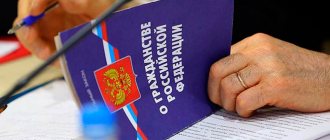Since 2021, the world has seen a worsening migration crisis, which is expressed not only in an increase in the number of migrants, but also in their illegal behavior on the territory of receiving countries. In order to prevent such offenses on the part of foreigners and stateless persons, the legislation of many states provides for such a special type of punishment as deportation from the country. Let's figure out what administrative deportation is, for what violations it can be assigned, how it is carried out and in what order it is appealed.
Expulsion: what is it?
The list of administrative measures that can be applied within a particular country is determined by the laws of each of them separately - there is no unified international administrative legislation. This, however, does not prevent most developed countries from using such a form of responsibility as expulsion.
Thus, taking into account the legislation of European countries, Russia and the USA, administrative expulsion is one of the forms of administrative punishment applied to foreigners and stateless persons for committing certain administrative offenses, if such punishment is provided for by the sanction of the article regulating the punishment (in Russia this is the Administrative Code ).
The expulsion procedure involves the forced expulsion or independent controlled departure of a foreigner or stateless person outside the state in which he was assigned this type of punishment.
Taking this into account, the specific grounds on which deportation from the country can be ordered are determined separately by the legislation on administrative offenses of each state.
As a rule, this form of liability is established:
- in the interests of national security;
- for the purpose of maintaining public order;
- to protect the health and other interests of citizens;
- in order to ensure the rights and freedoms of other citizens.
Since expulsion acts as a measure of coercion to legal behavior, in addition to the punishment itself, it is also prescribed for the purpose of preventing administrative offenses. Removal is accompanied by a ban on future entry into the country. The duration of the ban is determined based on the specific circumstances of the situation that became the basis for such a decision, as well as the circumstances associated with staying on the territory of the state.
Since this form of liability is a type of punishment for an offense, in the vast majority of cases it is imposed by court decision. Exceptions are cases when the offense is committed upon entering the country - in this case, the decision is made by officials of the migration authorities. Let us note that in the Russian Federation administrative deportation cannot be carried out against foreign military personnel.
Please note that expulsion as a type of punishment should be distinguished from expulsion by deportation, which is also a form of responsibility.
Administrative deportation is a punitive measure applied to foreigners and stateless persons if they commit administrative offenses. In this case, deportation is possible both voluntarily and forcibly. The grounds and rules by which it is applied are determined by each country separately.
The difference between expulsion and deportation
Despite the formal similarity of the concepts, expulsion and deportation have different legal natures and the grounds on which they are applied. Thus, deportation is used by migration authorities when a foreigner or stateless person loses the legal right to stay in the country or such right is terminated for reasons independent of him - they cannot deport for an administrative offense. Expulsion is applied to foreigners and stateless persons even if they have legal grounds for staying - as a measure of responsibility for their own misconduct.
There are also procedural differences. Firstly, deportation for an offense is applied in the vast majority of cases by the courts, while deportation is the prerogative of the migration authorities. Secondly, deportation is possible both voluntarily and compulsorily, while deportation is exclusively compulsory.
It is worth noting that expulsion is also different from readmission, however, if there is an international agreement, the former is possible in the same manner as the latter.
Main reasons for expulsion
Administrative deportation awaits foreigners who have committed violations regulated by Art.
18.1-18.19 Code of Administrative Offenses of Russia. Note: expulsion is considered an additional measure of influence on violators. The main punishment for offenses committed is a fine. Despite this, administrative expulsion is a common occurrence.
Read also: How to obtain Israeli citizenship
Cases of administrative violations committed by foreign citizens can be considered as quickly as possible. At the same time, the offender is not provided with an interpreter and the relatives of the migrant from Russia are not informed about the incident. Employment contracts and other documents are also not taken into account.
Articles 18.1-18.19 of the Code of the Russian Federation on Administrative Offenses
Violation of the State Border regime of the Russian Federation
According to the norms of current legislation, a migrant has the right to remain unhindered in the territory of the Russian Federation for no more than 90 days.
There are exceptions to these rules. These include the following situations:
- the period of stay on the territory of the Russian Federation can be extended in accordance with provisions No. 114-FZ and No. 115-FZ;
- the period of stay in Russia may be increased on the basis of other legal acts.
If, after the specified time, a foreigner who does not fall under the exception remains in Russia, a decision on administrative deportation will be made against him. In addition, he will be prohibited from entering the territory of the state for 3 years from the moment of crossing the border.
Violation of the regime at checkpoints across the State Border of the Russian Federation
When entering the territory of Russia and crossing the border checkpoint, citizens are obliged to comply with the requirements of not only domestic legislation, but also the rules stipulated by international agreements.
Each type of border (passenger, sea, one-way, two-way, etc.) has its own rules. The main task of the adopted standards is to control the flow of migrants entering Russia by supervisory authorities.
If the established rules are violated, a person who has citizenship of any state (especially if there is an agreement between him and the Russian Federation) can only get by with a warning or a fine, the amount of which starts from 1000 rubles. The stateless person will be expelled immediately.
Reference: a stateless person is a person who does not have citizenship of any country.
Violation by a foreign citizen or stateless person of the regime of stay in Russia
This category includes narrow offenses such as:
- Failure to comply with the transit regime.
- Lack of permission to stay and/or reside in the Russian Federation.
- Late registration with migration authorities.
- Forgery of documents.
- Lack of documentary evidence of the purpose of visiting Russia.
All designated offenses relate to administrative violations and entail a penalty of 2,000 to 5,000 rubles. Expulsion in these situations is used extremely rarely.
Violation of the rules for attracting and using foreign labor in the Russian Federation
Expulsion from the country is a punishment for persons carrying out unofficial labor activities in the territory of the Russian Federation. In addition to the lack of an employment contract, the reason for administrative expulsion may be failure to comply with other requirements of Russian labor legislation.
Arriving in Russia to work
Immigration violation
Failure to comply with the conditions under which permission to enter the Russian Federation also threatens the foreigner with deportation. Existing requirements include:
- absence of viral diseases;
- compliance with the conditions and terms of entry and exit from the Russian Federation;
- absence of a valid criminal record in the foreigner’s home country.
Legislation on expulsion from the Russian Federation
The basis of Russian legislation on expulsion, of course, is the Code of Administrative Offences. In particular, Art. 3.2 of the Code of Administrative Offenses defines expulsion as one of the types of administrative punishment. At the same time Art. 3.10 of the Code of Administrative Offenses sets out the definition of administrative expulsion, the subjects to which it can be applied, as well as other features of the procedure.
In addition, the Code of Administrative Offenses, as the main law on expulsion, contains an exhaustive list of types of administrative offenses for which such punishment can be imposed. These include, in particular:
- drug use, refusal of an official’s request to undergo a medical examination (Article 6.9 of the Administrative Code);
- propaganda of non-traditional sexual relations among minors (Article 6.21 of the Administrative Code);
- violation of the rules of entry and stay (Article 18.8 of the Administrative Code);
- illegal employment (Article 18.10 of the Administrative Code);
- providing false information when going through migration registration (Article 19.27 of the Administrative Code);
- violation of the rules of conduct at sporting events (Article 20.31 of the Administrative Code) and so on.
Article 34 of the Federal Law “On the Legal Status of Foreigners in the Russian Federation” determines the procedure in which administrative expulsion from the Russian Federation is carried out. In addition, the Federal Law “On the procedure for leaving the Russian Federation and entering the Russian Federation” also regulates deportation. In particular, Art. 27 of the law defines the terms of the entry ban applied during expulsion.
Depending on the circumstances, the migrant will receive an entry ban for a period of 5 to 10 years, even if before that he had the right to temporary residence or a residence permit in Russia.
Administrative deportation procedure
As we have already found out, the only basis for starting the deportation procedure can be a court decision (in exceptional cases, the migration authority) imposing this type of punishment. Depending on the circumstances, the judge may decide on the forced expulsion or controlled independent departure of the foreign citizen. Contrary to popular belief, foreigners in this case are not placed under arrest, unless this is required by criminal law as a preventive measure.
Depending on the measure of responsibility chosen by the court and the form of expulsion, according to Art. 32.10 of the Code of Administrative Offenses, its execution can be carried out by transferring the citizen to authorized persons of a foreign state or by independently leaving the country. Let's look at these forms of expulsion in more detail.
Forced expulsion
Forced expulsion of foreigners from the Russian Federation, carried out on the basis of court decisions, in accordance with Part 3 of Art. 34 of the Federal Law “On the Legal Status of Foreigners in the Russian Federation” is carried out by bailiffs - it is to them that the decision is received after it is issued. According to Part 5 of Art. 3.10 of the Code of Administrative Offenses, in the case of forced expulsion, the court also has the right, in order to execute the punishment, to apply to foreigners detention in a special institution of the migration authorities, in which the expelled citizens are kept immediately until the execution of the sentence.
As established by Art. 32.10 of the Administrative Code, forced deportation involves the transfer by bailiffs of a person to representatives of the country to whose territory he is subject to deportation. According to Art. 109.1 of the Federal Law “On Enforcement Proceedings”, this involves purchasing a travel ticket for such a person, transporting it to the checkpoint across the border of the Russian Federation and officially handing it over to the border guards of a foreign state.
After the execution of the court order, the bailiff draws up the corresponding act and reports this to the migration authorities and the Ministry of Foreign Affairs, which, in turn, reports the expulsion to the diplomatic mission of the country of which the expelled person is a citizen.
Self-supervised departure
The second form of removal is self-supervised removal. This form provides for the voluntary departure by a foreigner of the territory of the country from which he is being expelled within the time limits specified by law. For example, in Russia, a person in respect of whom a decision has been made to expel him by independent departure, in accordance with Part 5 of Art. 32.10 of the Code of Administrative Offences, must leave the country within 5 days, otherwise the procedure for forced deportation will be launched.
Please note that punishment in the form of independent departure, based on Part 6 of Art. 3.10 of the Code of Administrative Offences, can be assigned only in the case when it is carried out at the expense of the expelled person, the state of his nationality, or the legal entity and individual who invited the foreigner to the country.
Despite the voluntary implementation of the resolution, it is subject to control by the migration authorities, who, after the expulsion, draw up a corresponding act and report this to the Ministry of Foreign Affairs. The ministry, in turn, reports this to the diplomatic mission of the country of nationality of the deportee.
Who can't be expelled?
Administrative deportation cannot be imposed on a citizen of the Russian Federation. It cannot be deprived of citizenship or transferred to another state. In addition to Russians, several categories of foreigners cannot be expelled.
A foreigner who has a close relative of a Russian citizen or a person who has the right to live within the Russian Federation legally
If a foreigner has a close relative in Russia, then by law he cannot be expelled from the country.
Close relatives include:
- children;
- spouses;
- parents.
Important: the relative must permanently reside in the Russian Federation and be a citizen of our country.
A foreigner who came to Russia as a political refugee
Foreigners recognized as refugees cannot be expelled from Russia. This also includes citizens of states on whose territory military operations are taking place.
Important: before being assigned the appropriate status, a foreign citizen may be required to leave the Russian Federation.
Foreign military personnel
They cannot expel from Russia foreign military personnel who:
- are serving in the RF Armed Forces;
- are representatives of the CSTO countries that participate in joint military operations in Russia.
Read also: Car rental abroad
These categories of military personnel cannot be forced to leave the country in accordance with the provisions of Art. 3.10 part 3 of the Code of Administrative Offenses of Russia.
Diplomatic employee
Foreigners serving in diplomatic missions and consulates can be expelled only by special decision of the highest supervisory authorities. This category of citizens is in Russia on individual terms and an ordinary civil court cannot impose such a punishment on them.
Expulsion of minors
The legislation of most countries that use administrative expulsion establishes that responsibility for administrative offenses begins at the age of 16. However, the generally accepted age of majority is 18 years. Thus, the deportation of minor foreigners is possible only if at the time of committing the administrative offenses provided for by law, they were 16 years old. If at the time of committing the offense the foreigner has not reached this age, administrative punishment is not applied to him, therefore, he cannot be expelled.
Separately, it is worth noting cases where parents of minors are expelled. Taking into account Art. Art. 8, 9 of the Convention on the Rights of the Child, which require respect for family life and the impossibility of separating parents and children, the expulsion of parents is possible only in exceptional cases. In the context of this, government authorities of countries that make relevant decisions must proceed from the real need to assign such a measure of responsibility.
Therefore, in the presence of minor children, the expulsion of parents is used only as the only possible measure to achieve the goals of such punishment. And it does not apply to minor children of expelled persons.
Customer Reviews
Review by Lurie L.D. I, Lurie L.D., want to express my gratitude and gratitude for the competent advice and cordial attitude towards me as a client.
Thanks to Mavrichev S.V. from Bars Dan A. I thank the wonderful Lawyer Sergei Vyacheslavovich Mavrichev for thorough, competent advice and human mutual assistance to all his clients who are in deep need of qualified and timely legal and psychological advice.
Leopard Dana A. 09/18/2018
Review by Marcheilo I.V. On September 24, 2021, I turned to Konstantin Vasilievich for legal advice. I would like to express my gratitude for your sensitive, attentive attitude and qualified assistance. I received a comprehensive answer to all my questions. They helped a lot. Thank you! Sincerely, Marcheilo Irina Vladimirovna.
Gratitude from Matvey Fomin I, Matvey Alekseevich Fomin, am grateful to Vasily Anatolyevich Kavalyauskas for the timely legal advice and prompt assistance in resolving my issue. Calm and decisive. Thank you.
Fomin M.A.
Gratitude from Vraveevsky S.A. Sergey Vyacheslavovich! Thank you very much for the consultation! All the details were disclosed to me in detail, all questions were answered comprehensively. I am very glad to receive help from a qualified specialist!
Vraveevsky S.A. 12/18/2018
Gratitude from Busygin A.I. I express my gratitude to Vasily Anatolyevich Kavalyauskas for the qualified management of my case, competent advice and justification for the decision, which led to compensation of the stated claims.
Sincerely, Busygin Alexander Ivanovich
26.12.2017
Letter of gratitude to Ermakov A.V.
Gratitude from Kikkas V.P. Kikkas V.P. I am grateful to the Legal Agency of St. Petersburg for understanding the situation and timely assistance in my seemingly hopeless situation, personally to Denis Yuryevich Stepanov, I hope to continue to cooperate.
Kikkas V.P. 08.11.2018
Gratitude to Solovyov I would like to express my deepest gratitude and appreciation to Konstantin Vasilievich Solovyov for his attentive attitude and very competent consultation. And if I ever need legal support, I will definitely turn to him. I would also like to mention Daria Valentinovna Kutuzova, who greeted me with a smile and answered some of my questions. I wish the company success, further prosperity, and more clients.
Gratitude from Volkotrub Yuri Vasilyevich Thank you very much for the quality advice on the issue that interests me. With best wishes to Denis Yuryevich Stepanov, who advised me.
Volkotrub Yuri Vasilievich
Time limits for expulsion
As already mentioned, persons against whom a decision on expulsion has been made are also prohibited from entering the territory of the country from which they were expelled. The duration of such a prohibition depends on the specific circumstances of the case and the domestic legislation of the country. For example, in Russia, according to Art. 27 Federal Law “On the procedure for leaving the Russian Federation and entering the Russian Federation”, the period of the entry ban is 5 and 10 years.
A 5-year ban applies in general cases where a decision on deportation has been made against a foreigner. If such a decision was made more than once—two or more times—the ban will be in effect for 10 years.
Expulsion and fine
Administrative expulsion in itself does not provide for any penalties against the violator. However, a fine may be imposed on such a person as a primary or additional punishment in addition to deportation. According to Russian legislation (Part 1.1 of Article 32.2 of the Code of Administrative Offences), such a fine must be paid by a foreigner no later than the next day after the court ruling gains legal force.
In addition, penalties may be imposed on a foreigner or stateless person if a decision was made against him to expel him by independent departure, but he did not voluntarily comply with such a decision. According to Russian legislation, in accordance with Part 3 of Art. 20.25 of the Administrative Code, such actions entail a fine of 3-5 thousand rubles, followed by deportation, but forcibly.
Is it possible to cancel the deportation?
Like any other decision of officials, the deportation order, if it was made illegally, can be challenged by the interested party in the government authorities of the country from which it was expelled.
In Russia, as established by Art. 30.1 of the Administrative Code, appealing the decision is possible in two ways:
- exclusively in judicial proceedings by a higher court - in cases where the deportation order was made by the court;
- to higher authorities or in court - if the decision was made by officials of border authorities upon entry.
According to Art. 30.3 of the Administrative Code, an appeal is possible within 10 days from the date of receipt of the decision or its copy. There is no state fee for such an appeal. According to Art. 30.5 of the Administrative Code, such a complaint must be considered within 24 hours from the moment of its filing, regardless of which body and which official it was sent to. If the illegality of the decision is established, the court or a higher authority will cancel the decision and terminate the proceedings in this regard.
Court decisions
Restoring authorship of a doctor for an invention and a unique method of performing an operation
Dispute with LLC Lenspetsstroy
Driver hits drunk pedestrian
Divorce: how to divide property so that everyone is happy
Half a million in penalties for the kitchen
Phone repair service paid 40,000 rubles for poor quality service








